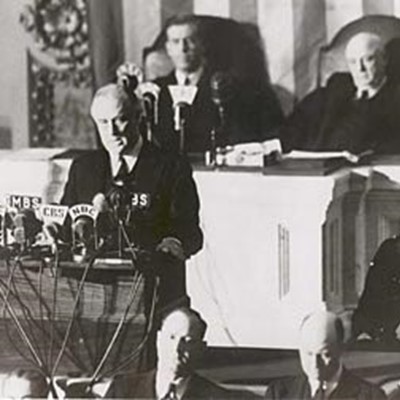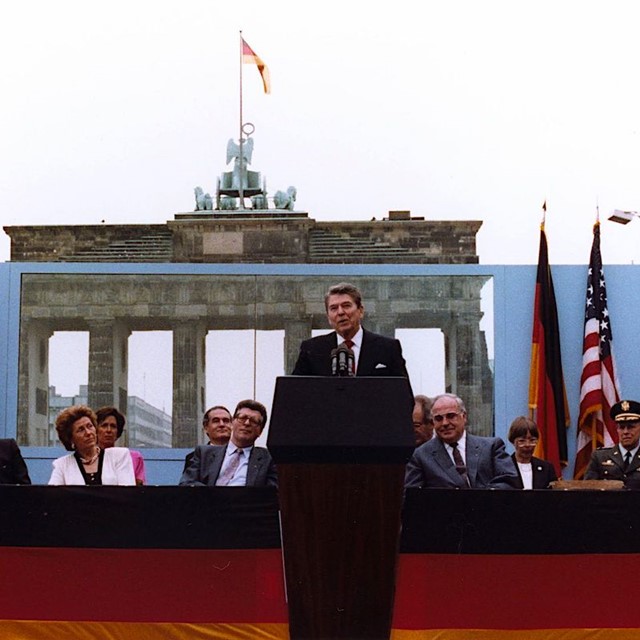
By MORGAN MAGNARELLA
Two American presidents, two speeches separated by 24 years. In the month of June, John F. Kennedy and Ronald Reagan spoke in Germany's capital city. Both speeches are remembered for famous lines--as each man called for a removal of the Berlin Wall.
June 1963: A German phrase and an urban legend
President Kennedy gave his famous "Ich bin ein Berliner" speech on June 26, just 22 months after Soviet-controlled East Germany had put up the Berlin Wall to keep their citizens from escaping to freedom in the West. The speech, delivered to an estimated crowd of 450,000 people, is one of the most famous from the Cold War period and considered one of Kennedy’s best.
Historian Andreas Daum reports that Kennedy had considered a number of phrases, even entire paragraphs in German for that speech. But his team, including speechwriter Ted Sorensen, determined that extensive use of German would be a mistake. They settled on two German phrases, spelled out phonetically in Kennedy’s text.
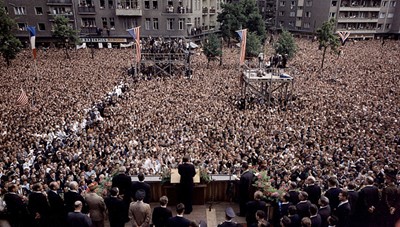 Kennedy spoke to a crowd of 450,00 in West Berlin on June 26, 1963
Kennedy spoke to a crowd of 450,00 in West Berlin on June 26, 1963
Even as he spoke it, Kennedy is said to have been uncertain of how the line would be received:
"We can look forward to that day when this city will be joined as one...when that day comes, as it will, the people of West Berlin can take sober satisfaction in the fact that they were in the front lines...all free men, wherever they may live, are citizens of Berlin, and therefore, as a free man, I take pride in the words 'Ich bin ein Berliner.'"
Daum writes that as the audience’s positive response unfolded, "Kennedy, who fiddles a bit with his suit jacket, is grinning like a boy who has just pulled off a coup."
Despite Kennedy's attention to carefully delivering "I am a Berliner," speculation emerged that by including "ein" in the phrase he’d actually said "I am a jelly doughnut."
A Berliner is a type of jelly doughnut-like pastry popular in some West German areas. The story first appeared as a scene in a novel but was repeated as fact by some news organizations. There's no evidence the audience interpreted Kennedy's words that way.
June 1987: A controversial line that almost goes unnoticed
On June 12, 1987, President Reagan stood before the Brandenburg Gate to honor Berlin's 750th anniversary. Nearly 26 years after the city's initial separation, Reagan addressed the people of West Berlin--and Soviet leader Mikhail Gorbachev:
"General Secretary Gorbachev, if you seek peace, if you seek prosperity for the Soviet Union and eastern Europe, if you seek liberalization, come here to this gate. Mr. Gorbachev, open this gate. Mr. Gorbachev, tear down this wall!"
There was little media coverage of Reagan's address and for a long time it didn't receive much notice. The Soviet news agency Tass claimed Reagan gave an "openly provocative and war-mongering speech." It wasn't until the wall collapsed two years later that people started viewing Reagan's line as inspiration for the event.
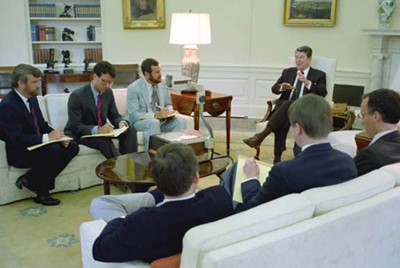 Speechwriters meet with President Reagan in the Oval Office on May 18, 1987. Peter Robinson is second from the left. (Ronald Reagan Library)
Speechwriters meet with President Reagan in the Oval Office on May 18, 1987. Peter Robinson is second from the left. (Ronald Reagan Library)
Speechwriter Peter Robinson, who coined the phrase "tear down this wall," recalled that the State Department and the National Security Council disapproved of the expression. He was still working on a draft the morning Reagan was to give the speech.
In an article for the National Archives, Robinson writes about his experience:
"Mr. President," I said, "I learned on the advance trip that your speech will be heard not only in West Berlin but throughout East Germany." Depending on weather conditions, I explained, radios would be able to pick up the speech as far east as Moscow itself. "Is there anything you'd like to say to people on the other side of the Berlin Wall?"
The President cocked his head and thought. "Well," he replied, "there's that passage about tearing down the wall. That wall has to come down. That's what I'd like to say to them."
I spent a couple of days attempting to improve the speech. I suppose I should admit that at one point I actually took "Mr. Gorbachev, tear down this wall" out, replacing it with the challenge, in German, to open the Brandenburg Gate, "Herr Gorbachev, machen Sie dieses Tor auf."
"What did you do that for?" Tony [Griscom] asked.
"You mean you don't get it?" I replied. "Since the audience will be German, the President should deliver his big line in German."
"Peter," Tony said, shaking his head, "when you're writing for the President of the United States, give him his big line in English." Tony put "Mr. Gorbachev, tear down this wall" right back in.
On the way to the wall, the President insisted that the line remain, saying, "the boys at State are going to kill me, but it's the right thing to do."
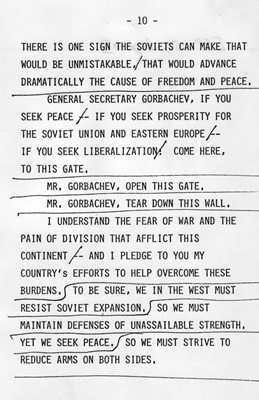 A page from the speaking copy Reagan used in Berlin, showing "tear down this wall" and how he marked it up for delivery. (Ronald Reagan Library)
A page from the speaking copy Reagan used in Berlin, showing "tear down this wall" and how he marked it up for delivery. (Ronald Reagan Library)
Lessons to apply to our public speaking
While you may not be giving an important speech calling for greater freedoms and an end to the Cold War, you can still apply some ideas from these speeches to your presentations:
- Using a foreign phrase can be tricky. Even with the help of a translator, a non-native speaker can still get it wrong. You only need to think of quirky American regional expressions, such as the Southern expression "Can you crack the window a bit?" to understand the risk of being misunderstood.
- Speaking an audience's language can be powerful, too. If used correctly, speaking your audience's language--even one simple phrase--can show your respect for them and your desire to connect. For a business presentation to an international audience, for example, just making the effort to say good morning in the local language can be appreciated--especially if your sincere desire to be respectful comes through.
- Direct, simple language can outperform a fancy statement. It doesn't get much simpler or more direct that Reagan's "tear down this wall," and these four one-syllable words have become one of the best remembered and most-quoted lines from all of Reagan’s speeches.
- Format your text to help your delivery. Kennedy spelled out his lines phonetically. You can do the same in your notes when you’re dealing with a technical term or name that challenges you. Remember--how your words look on that page is your business! Spell and format in ways that work for you.
Learn more:
You’ll find speechwriter Peter Robinson's story behind Reagan's speech here.
To see Regan's full Berlin Wall address (which he opens with a reference to Kennedy's speech), go here.
For more on the jelly doughnut urban legend, read this article from Smithsonian Magazine.
Below, watch Kennedy delivering his famous German line--and using a bit of humor about the translation:


